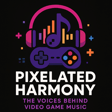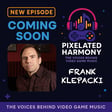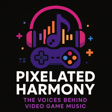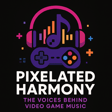
Pixelated Harmony - Tom Salta
In this month's episode of Pixelated Harmony: The Voices Behind Video Game Music, it's spooky season and I wanted to sit down with someone that I knew was no stranger to bringing terrifying games to life with music. My guest this week is none other than Tom Salta, Artist, Composer and Producer for some little title you may have heard of like Halo, Killer Instinct, PUBG, Wolfenstein: Youngblood, one of my favorites Deathloop, and most recently, a game I don' think I have the courage to play, The Outlast Trials.
We talk about Tom's journey as an artist, Atlas Plug, the benefits of meditation and a little preview of what he has going on now!
Website: https://www.tomsalta.com/
Youtube: https://www.youtube.com/@TomSalta
X: https://x.com/TomSalta
Pixelated Harmony YouTube: https://youtube.com/@Pixelated-Harmony
X: https://x.com/smitty2447



